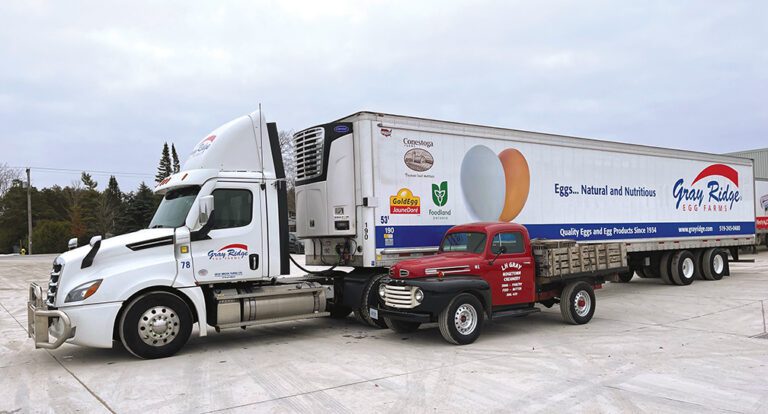
Here are some “gee-whiz” facts to go with your morning coffee: A semi trailer, fully loaded, can haul 22,600 dozen eggs. That breaks down to 271,200 eggs per trailer, or the equivalent of more than 90,000 three-egg truck stop omelets.
Gray Ridge Eggs, Inc., one of the largest egg graders in North America, delivers hundreds of these payloads each week, keeping some of the largest grocery and food service suppliers in Canada and the U.S. well stocked.
Gray Ridge hauls so many eggs that even industry long-timers like Director of Transportation Peter Robinson, who’s worked for the company 15 years, are in awe. In addition to Gray Ridge, Robinson is responsible for Golden Valley Foods, Sparks Eggs, and Egg Solutions
“Gray Ridge in Ontario does all of Ontario except for the northern part,” Robinson said. “We do, in a week, 1,650 farm pick-ups, store deliveries, wholesaler deliveries — and we go seven days a week. We have two days off a year, Christmas and New Year’s.”
Despite what you might have seen about egg prices in the grocery store lately, there’s nothing in Gray Ridge Eggs’ performance that suggests there’s any shortage in demand for its product.
During Robinson’s career at Gray Ridge, the number of company drivers has more than doubled — they now employ 62 drivers — and the number of truckloads delivered has grown by 350 trailers per month.
In fact, the only thing that seems to be a drag on operations around here is the driver shortage, which in Gray Ridge Eggs’ case is made worse by the fear many have of hauling such a delicate product.
“I think we don’t get drivers because a lot of them are concerned about the fragility of the product, so it kind of scares them off a little bit,” Robinson said. “Eggs are transported top to bottom, and they carry a tremendous amount of weight. You’d be very surprised how much weight you can put on an egg — and they can still take a trip across Canada.”
Even so, the product is still extremely fragile, and shipping requires extra care.
“The difficulty is when you side-impact them; that’s when they crack,” Robinson explained.
“So, we ship two ways: One goes in fiber boxes and a lot of stores go in wired cages although that seems to be working its way out of the system because it’s really an old way of doing it,” he said. “We have three different sections of load security, placed exactly where the layers go, so we can secure it in the best way without damaging it. If you put your strapping in the wrong spot, it will push against the eggs and cause damage. But the product is actually very strong — as long as you don’t impact it from the side.”
Another misnomer is that eggs, all being the same shape and sorted to be the same size, are easy to manage as far as logistics go. While that may have once been true, the variety of eggs demanded by modern consumers makes things considerably more complicated.
Gray Ridge Eggs is just one of three egg brands the company offers. The other two, Conestoga and GoldEgg/JuaneDore, are gourmet brands that deal in free-range, vitamin-fortified, and other specialty eggs that run contrary to the standard white and brown varieties. Each of these two brands requires slightly different handling that lends complexity to the process, from picking them up from farms to delivery to grading and production facilities, and finally, shipping to clients.
“The major change when you bring in all the different brands is for the production group,” Robinson said. “For trucking, we do have to be cognizant of what’s being graded. For example, with organic eggs — those are cleaned differently and done by only our organic-certified plant, so we have to bring them all in on certain days.”
To borrow a catchphrase from TV infomercials: But wait, there’s more!
“The other specialty is Vitamin D (eggs), because they run those all at one time,” he said. “Obviously, the idea with a big grading machine is that you want to be able to run as much of the same product as you can, so you aren’t making all sorts of changes to different cartons on the machine. So, we do work very closely with production to ensure that the eggs that they need to run are run.”
Beyond these vagaries, hauling eggs isn’t any more or less complicated or troublesome than hauling any other perishable load, according to Robinson. The Gray Ridge Eggs fleet has to deal with the same challenges as other trucking companies — which during the COVID-19 pandemic were substantial.
Looking back, however, Robinson says the company weathered such difficulties very well.
“We definitely struggled through COVID with drivers, but one of the good things about our driving position is that it’s consistent,” he said. “We haven’t laid off any drivers, I don’t think, ever. We continue to grow, year in and year out, with the population. We did have some difficult times during COVID —but I’ve got to be honest, we have a fantastic drivers pool.”
What does it take to be a Gray Ridge driver?
“I look to hire guys that are customer-minded along with being good drivers,” Robinson said. “So, those times we were ‘lean,’ the drivers stepped up and took extra work for us, and now we’re back to being able to hire guys fairly consistently. I give them a lot of credit for how they performed through some pretty challenging times.”
Photos courtesy of Gray Ridge Egg Farms
This article originally appeared in the July/August 2023 edition of Truckload Authority, the official publication of the Truckload Carriers Association.
Dwain Hebda is a freelance journalist, author, editor and storyteller in Little Rock, Arkansas. In addition to The Trucker, his work appears in more than 35 publications across multiple states each year. Hebda’s writing has been awarded by the Society of Professional Journalists and a Finalist in Best Of Arkansas rankings by AY Magazine. He is president of Ya!Mule Wordsmiths, which provides editorial services to publications and companies.

















